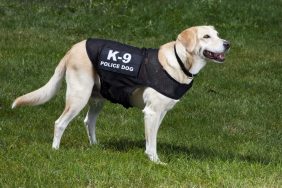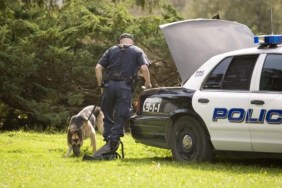"Any dog that has the drive, confidence, and desire to work can do it [detection dog work]! Breed does not dictate a dog...
Posted by Animal Farm Foundation on Thursday, June 11, 2015
You've probably seen police with a German Shepherd Dog or a Belgian Malinois. Maybe you've even seen Beagles around the airport. But you don't often see Pit Bulls in K9 patrols. That's a fact that may change, and it's already started to thanks to organizations like Animal Farm Foundation, which works with the Austin Pets Alive! shelter system and Universal K9, a training program, to rescue Pit Bulls and put them to work as detection dogs in police departments around the country.
There are tons of benefits to using rescue Pit Bulls, not the least of which is the cost. A purebred, trained German Shepherd or Belgian Malinois goes for up to fifteen thousand dollars, whereas a rescued Pit Bull comes very cheap. In fact, Universal K9 trains Pit Bulls and places them in police departments free of charge thanks, in part, to a sponsorship from Animal Farm Foundation.
You may remember a few months ago when DogTime reported on Kiah, the rescue Pit Bull who joined the Poughkeepsie Police Department in New York. She's one of the pups who made her way to a K9 unit thanks to Animal Farm Foundation's efforts. Her handler said she was easy to train because she was willing to please and happy to use her nose, which is perfect for detection work.
[caption id="attachment_34963" align="alignnone" width="680"] (Picture Credit: ABC40 KRHD)[/caption]
(Picture Credit: ABC40 KRHD)[/caption]
But Kiah isn't the only Pit Bull K9 on the job, nor is she the first. In 2012, a Temple Police Department K9 team placed fifth in a national narcotics detection competition. Cyrus, a 6-year-old Pit Bull competed alongside his handler among about a hundred other teams.
Posted by Protect Pit Bulls from BSL on Thursday, January 28, 2016
Shaka is another Pit Bull hero who was rescued by an advocate who found her in a city pound in New York. When her rescuer found that she had a lot of determination, she contacted Washington State Patrol Academy. After 18 weeks of training, Shaka began serving on the force in the Washougal Police Department where she stayed for four years before transferring to another department in Oregon. Her handler encouraged people to come up and pet her when she wasn't working so they could get to know what Pit Bulls are really like.
Posted by K9 Ruby, Street Dog to Police Dog on Monday, June 8, 2015
Ruby is yet another Pit Bull who was found by Animal Farm Foundation's efforts. She was picked up as a stray from the streets of Austin and spent 220 days in a shelter before she was finally accepted by Universal K9. She's now a member of the Chattahoochee Hills, Georgia Police Department, and on her first night shift she sniffed out a half pound of marijuana, 8 grams of methamphetamine, and several Percocet pills.
Posted by Libby MCCO K-9 on Tuesday, May 12, 2015
Another impressive Pit Bull police K9 is Libby. She's also a graduate of the Universal K9 program and was only days away from being euthanized at a high kill shelter when she was rescued. She made headlines in 2015 when she investigated a drug house and found three mason jars and a food bag full of marijuana, steroids, and painkillers. She posed for a photo with her findings with a snarling grin that sent out a message to bad guys everywhere: you can't hide anything from this Pit Bull.
The common stereotype of Pit Bulls is that they're dangerous dogs who attack without warning. But these pups prove that Pit Bulls are capable of amazing things and can help us all by keeping us safe. If your police department doesn't have a Pit Bull on its K9 unit now, keep an eye out. You may see one soon.
Police Departments are finally getting it, instead of spending $10,000.00 to $15,000.00 for a trained Belgian or GSD...
Posted by Roxy Tucker The PTSD Service Dog on Friday, January 29, 2016
Several sources also claim that Pit Bulls are starting to be used by the military, as well. Mostly these dogs are used for detection of narcotics, bombs, and bodies, or to track criminals on the run, and aren't used often to attack. Perhaps that's because, as one Facebook user put it, "The hardest thing for them to teach them... is to get them to be aggressive towards people." So much for the stereotype.
Are you glad to see Pit Bulls getting a fair chance to work as K9 units? Are you excited about the work of all the Pit Bulls mentioned above? Let us know in the comments below!










